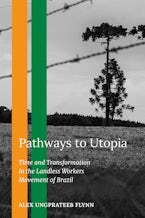"Pathways to Utopia is an eloquently written account of the Landless Workers Movement (MST), a group who contest what it means to be landless within a utopian framework. Through sensitive ethnography and remarkable theoretical nous, Flynn foregrounds how social justice is a life-long commitment best viewed through the lens of endurance rather rupture and slowness over eventedness. A Bergsonian prism of 'duration' upends commonly held assumptions about activism as reducible to dramatic moments of schism, providing a truly unique contribution to both the study of time and social movements. Foregrounding aesthetic registers of protest facilitates a critique of umbilical thinking that is based on linear cause and effect; instead, the utopian future is a complex dance of ever-shifting horizons, continuously invigorated by spatial, temporal, and corporeal relations. The outcome is a durational activism that is counter-utopian, where transformation twists pasts, presents, and futures into a topological knot of perpetual becoming." - Daniel M. Knight, co-editor of Porous Becomings: Anthropological Engagements with Michel Serres
"Beautifully written . . . Flynn's love for the people and the places and the cause shines through. His writing style and long-standing commitment together make this an extremely compelling read." - Wendy Wolford, author of This Land Is Ours Now: Social Mobilization and the Meanings of Land in Brazil
"Formally innovative, yet grounded in the lived experience of grassroots participants in one of the most important social movements in the hemisphere, this is a book we desperately need today. Flynn reveals the vital interplay of political organization with the dissident action of those who craft lives of meaningful struggle in land occupations." - Maple Razsa, author of Bastards of Utopia: Living Radical Politics after Socialism
"Flynn's book has the rare quality of combining rigorous scholarship with literary writing to exquisitely analyze how the longest social movement has been imagining an alternative collective future for the past 40 years." - Eduardo Dullo, Universidade Federal do Rio Grande do Sul

